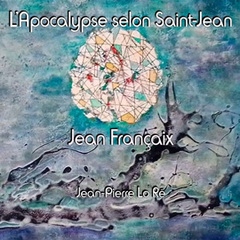Gegen Ende seines Lebens betrachtete Jean Françaix (1912-1997) sein einziges Oratorium, L’Apocalypse selon Saint-Jean, als sein bestes Werk, das seine gesamte Kunst zusammenfasste, obwohl er es bereits im Alter von 27 Jahren komponiert hatte!
Es entstand 1939 und wurde 1942 in Paris uraufgeführt. Das ‘Oratorio fantastique’ zeichnet sich durch seine große Besetzung mit zwei Orchestern aus. Das zweite Orchester soll die Kräfte der Hölle darstellen.
Das Werk basiert auf einem vom Komponisten adaptierten Text. Die Geschichte greift die letzte Episode des Neuen Testaments über die Apokalypse aus den Schriften des Heiligen Johannes auf. Das am Vorabend des Zweiten Weltkriegs geschriebene Werk war ein Versuch von Françaix, dramatische Tiefen und geistliche Themen zum Ausdruck zu bringen und sich von seiner oft heiteren Musik zu entfernen.
Wenn heute das Wort Apokalypse meist als Synonym für das Ende der Welt oder eine schreckliche Katastrophe verwendet wird, benutzt Françaix es im ursprünglichen Sinne, wo es wörtlich ‘Offenbarung’ oder ‘Enthüllung’, also das Aufdecken eines Geheimnisses bedeutet, das oft durch eine Vision oder einen Traum übermittelt wird.
Dieses Visionäre ist ein prägendes Merkmal der erhabenen Komposition von Jean Françaix und kommt auch gut in der Aufführung zum Ausdruck, die in der Eglise de la Trinité in Paris mitgeschnitten wurde.
Jean-Pierre Lo Ré hat das Oratorium schon mehrmals dirigiert und kann ihm seinen richtigen Charakter und seine Größe geben, ohne das Sensuelle zu vernachlässigen. Er kann mit Affekt und nicht ohne gesundes Pathos die starke Leuchtkraft der Musik wiedergeben.
Die Musik, teils vergeistigt, teils dramatisch expressiv, wird von den in der Trinité versammelten Musikern intensiv und engagiert dargeboten.
Die Tonaufnahme kommt mit der Kirchenakustik gut zurecht, und so kann man nur sagen, dass sich das aufwändige Unterfangen, das Oratorium in einer neuen Einspielung festzuhalten, durchaus gelohnt hat.
Als Bonus gibt es auf diesem Album das Klavierkonzert, ein kurzes Werk von 14 Minuten, gespielt vom Komponisten selber, der vom französischen Rundfunkorchester unter Georges Prêtre begleitet wird. Nach dem bedeutsamen Oratorium kommt es wie eine frische Brise daher, fein und elegant, brillant und frisch, mit einer Lebendigkeit und einem Hauch von Humor oder sogar Ironie sowie einem Schimmer von Melancholie im langsamen Satz.
Towards the end of his life, Jean Françaix (1912–1997) considered his only oratorio, L’Apocalypse selon Saint Jean, to be his finest work, a summary of his entire artistic output, despite having composed it at the age of just 27!
Composed in 1939, it premiered in Paris only in 1942. The text was adapted by the composer. The story covers the final episode of the New Testament concerning the Apocalypse, as written by St. John.
While the word ‘apocalypse’ is now usually used as a synonym for the end of the world or a terrible catastrophe, Françaix uses it in its original sense, where it literally means ‘revelation’ or ‘unveiling’, i.e. the uncovering of a secret, often conveyed through a vision or a dream.
This visionary quality is a defining feature of Jean Françaix’s sublime composition and is also well expressed in the performance, which was recorded in the Eglise de la Trinité in Paris.
Jean-Pierre Lo Ré has already conducted the oratorio several times and is able to give it its proper character and grandeur without neglecting the sensual. He is able to convey the strong luminosity of the music with affect and not without healthy pathos
The partly spiritualized, partly dramatically expressive music is performed with intensity and commitment by the musicians assembled in the Trinité.
The sound recording captures the church acoustics well, so it is clear that the arduous task of creating a new recording of the oratorio was worthwhile.
A bonus on this album is the Piano Concerto, a short 14-minute work played by the composer himself, accompanied by the French Radio Orchestra under Georges Prêtre. After the momentous oratorio, it comes across as a breath of fresh air, delicate, elegant, and brilliant, with a liveliness and a touch of humor or even irony, as well as a glimmer of melancholy in the slow movement.
Jacques Françaix: « The Apocalypse is enough to rank my father among the great composers »




















